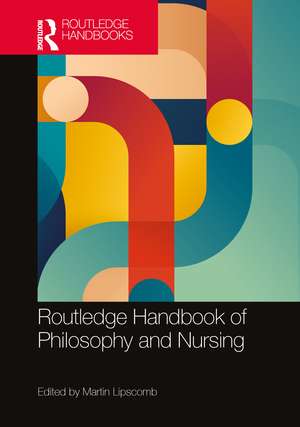Routledge Handbook of Philosophy and Nursing
Editat de Martin Lipscomben Limba Engleză Hardback – 19 sep 2023
The Handbook, which is split loosely into seven sections, begins with a foundational chapter exploring philosophy’s relationship to and with nursing and nursing theory. Subsequent sections thereafter examine a wide range of philosophic issues relevant to nursing knowledge and activity.
- Philosophy and nursing, philosophy and science, nursing theory
- Nursing’s ethical dimension is described
- Philosophic questions concerning patient care are investigated
- Socio-contextual and political concerns relevant to nursing are unpacked
- Contributors tackle difficult questions confronting nursing
- Difficulties around speech, courage, and race/otherness are discussed
- Philosophic questions pertaining to scholarship, research, and technology are addressed
Preț: 1817.42 lei
Preț vechi: 1913.08 lei
-5% Nou
Puncte Express: 2726
Preț estimativ în valută:
347.78€ • 371.88$ • 289.96£
347.78€ • 371.88$ • 289.96£
Carte tipărită la comandă
Livrare economică 17 aprilie-01 mai
Preluare comenzi: 021 569.72.76
Specificații
ISBN-13: 9781032114606
ISBN-10: 1032114606
Pagini: 534
Ilustrații: 6 Tables, black and white
Dimensiuni: 174 x 246 x 30 mm
Greutate: 1.14 kg
Ediția:1
Editura: Taylor & Francis
Colecția Routledge
Locul publicării:Oxford, United Kingdom
ISBN-10: 1032114606
Pagini: 534
Ilustrații: 6 Tables, black and white
Dimensiuni: 174 x 246 x 30 mm
Greutate: 1.14 kg
Ediția:1
Editura: Taylor & Francis
Colecția Routledge
Locul publicării:Oxford, United Kingdom
Public țintă
Postgraduate and Undergraduate AdvancedCuprins
1. Introduction. 2.Nursing, Philosophy, and Nursing Philosophy. 3. On the Contribution of the Nursing Theorists. 4.Philosophy of Science and Nursing Research. 5.What is the Art in the Art and Science of Nursing?. 6.The Knowledge of Nursology. 7.(Normative) Moral Theory and Nursing Practice. 8.Nursing: a moral profession?. 9.Remembering the Future: Nursing’s Social Ethics. 10.Nursing and Morality in China: The Necessity and Possibility of a Confucian Ethics of Care. 11.Islamic humanism: Towards Understanding Nursing Care for Muslim Patients. 12.Dependency. 13.Pain: Levinas and Ethics. 14.Vulnerability and Relations of Care. 15.Placebo Effect and Nursing. 16.Collectivism, personhood, and the role of patient and family. 17.A hermeneutical agential conception of suffering. 18.Hermeneutic phenomenology, person centred care, and loneliness. 19.Why thriving – and well-being – ought to be fundamental goals in nursing. 20.Life and Death: Nursing responses to euthanasia. 21.Care and Compassion in Nursing. 22.Nursing's endless pursuit of professionalization. 23.Medicine and Nursing Through the Advanced Nurse Practitioner Lens. 24.The promotion of resilience in nursing: reification, second order signification and neoliberalism. 25.Problematizing Moral Distress, Moral Resilience, and Moral Courage: Implications for Nurse Education and Moral Agency. 26.Equality, equity, and distributional justice in nursing: agism and other impediments. 27.Avoiding the Triumph of Emptiness: The Threats of Educational Fundamentalism and Anti-Intellectualism in Nursing Education. 28.Who knew? Towards a sociology of ignorance in nursing. 29.Self-sacrifice in nursing: Taboo or valuable reality?. 30.Is there a personal responsibility for health?. 31.Care and Its Entanglements. 32.Rethinking Holism: Expanding the Lens from Patient Experience to Human Experience. 33.Empathy and Dialogue in Nursing Care. 34.Navigating the Edges of Critical Justice Theory through the Logic of Nursing. 35.Anxiety and moral courage: The path to authentic nursing?. 36.Freedom of speech as a philosophy of nursing. 37.Using Philosophical Inquiry to Dismantle Dominant Thinking in Nursing about Race and Racism. 38.Perpetuating the whiteness of nursing: Enculturation and nurse education. 39.What can queers teach us about nursing ethics?. 40.No as an Act of Care: A Glossary for Kinship, Care Praxis, and Nursing’s Radical Imagination. 41.Phenomenology and nursing. 42.Is there anyone here who has a genuine medical problem? Health, illness, and Aristotle. 43.Concept analysis. 44.Epistemic injustice and vulnerability. 45.A process philosophy perspective on the relationality of nursing and leadership. 46.Technology and nursing. 47.Teaching and Learning Clinical Reasoning: Maximizing Human Intelligence, Expert Clinical Reasoning, Scientific Knowledge, and Decision-Making Supports.
Notă biografică
Martin Lipscomb is a Senior Lecturer at the University of Worcester's Three Counties School of Nursing and Midwifery (UK).
Descriere
Philosophy offers a means of unpacking and grappling with important questions and issues relevant to nursing practice, research, scholarship, and education. By engaging in these discussions, this Handbook provides a gateway to new understandings of nursing.
